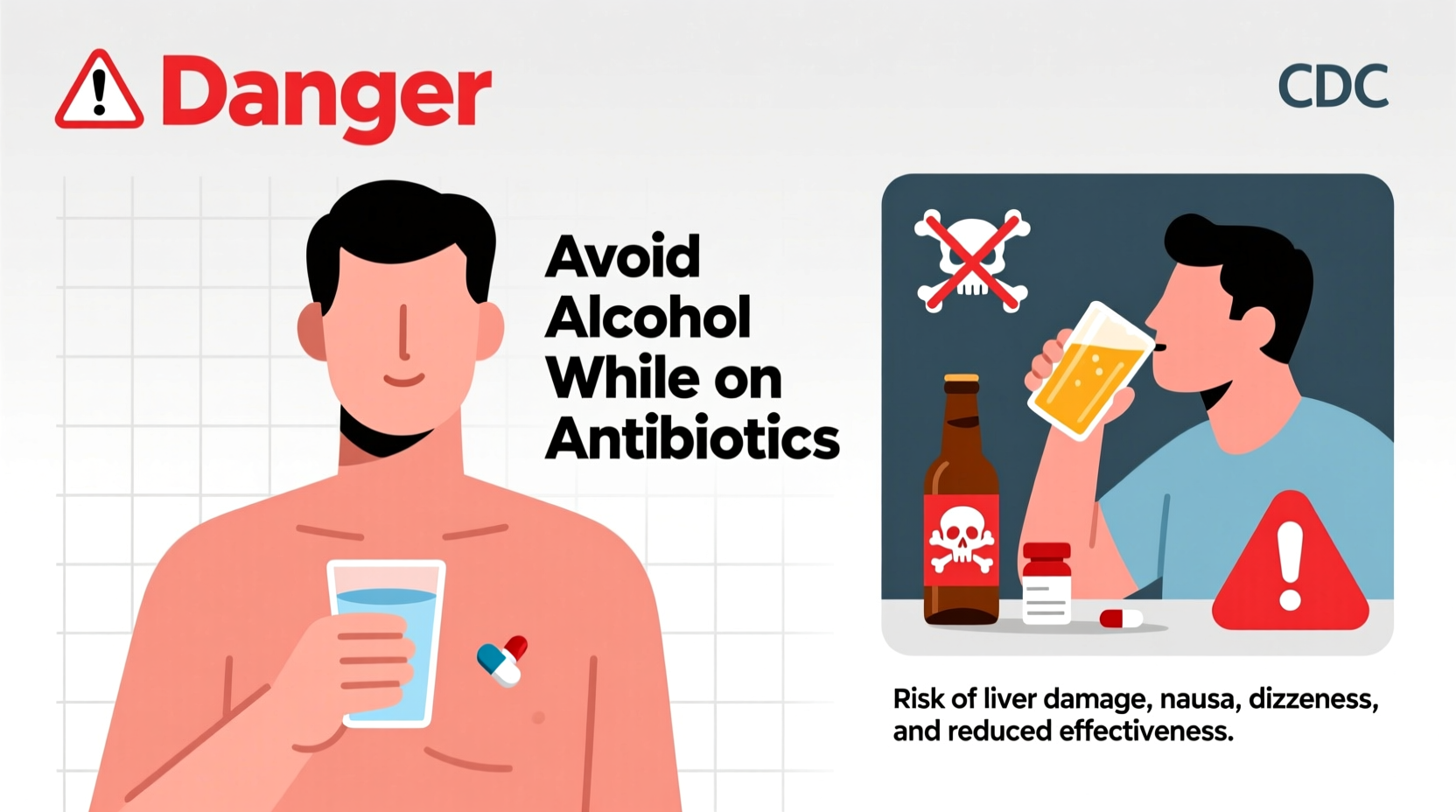When you're prescribed antibiotics, your focus is likely on getting better as quickly as possible. But what if you’re invited to a dinner party, celebration, or just want to unwind with a glass of wine? The question arises: can you drink alcohol while on antibiotics? The answer isn’t always a simple yes or no—it depends on the type of antibiotic, your health condition, and how alcohol might interfere with treatment. Understanding the potential risks and medical guidelines can help you make informed decisions without compromising your recovery.
How Alcohol Interacts With Antibiotics

Alcohol doesn’t directly neutralize all antibiotics, but it can significantly impact how your body processes these medications. The liver metabolizes both alcohol and many antibiotics, so consuming alcohol increases the organ’s workload. This can slow down the breakdown of the drug, potentially leading to higher concentrations in the bloodstream—or, conversely, reduce effectiveness by accelerating clearance.
More importantly, alcohol can worsen side effects commonly associated with antibiotics, such as nausea, dizziness, stomach upset, and fatigue. In some cases, combining alcohol with certain antibiotics can trigger severe reactions, including rapid heart rate, flushing, vomiting, and even liver damage.
Antibiotics That Are Dangerous With Alcohol
Not all antibiotics have serious interactions with alcohol, but several do. These medications inhibit an enzyme called aldehyde dehydrogenase, which the body uses to break down alcohol. When this process is blocked, acetaldehyde—a toxic byproduct—accumulates, causing a disulfiram-like reaction. Symptoms include:
- Severe facial flushing
- Chest pain and rapid heartbeat
- Nausea and vomiting
- Low blood pressure
- Headache and dizziness
The following antibiotics are known to cause such reactions:
| Antibiotic | Risk Level | Reaction Time After Alcohol | Avoidance Window |
|---|---|---|---|
| Metronidazole (Flagyl) | High | Within 1 hour | At least 72 hours after last dose |
| Tinidazole (Tindamax) | High | Within 30 minutes | At least 72 hours after last dose |
| Trimethoprim-sulfamethoxazole (Bactrim, Septra) | Moderate to High | 1–2 hours | 48 hours after completion |
| Cefotetan, Cefoperazone (less common injectable cephalosporins) | High | Immediate | During treatment + 72 hours after |
“Patients taking metronidazole must be explicitly warned about alcohol, including hidden sources like mouthwash, cough syrups, and sauces cooked with wine.” — Dr. Lena Patel, Infectious Disease Specialist
Antibiotics With Lower Risk, But Still Caution Needed
Some antibiotics don’t cause severe chemical reactions with alcohol, but that doesn’t mean drinking is risk-free. Even with safer medications, alcohol can still impair immune function, delay healing, and amplify side effects.
Examples include:
- Amoxicillin: No direct interaction, but alcohol may increase gastrointestinal discomfort.
- Doxycycline: Alcohol may reduce absorption and effectiveness, especially if consumed around the time of dosing.
- Azithromycin (Z-Pak): Limited interaction, but both substances can stress the liver, particularly in people with existing conditions.
In general, moderate drinking (e.g., one standard drink) may be tolerated with these drugs in healthy individuals—but only if approved by a healthcare provider. However, if you're fighting a serious infection, prioritizing rest and recovery over social drinking is strongly advised.
Real-Life Scenario: A Weekend Trip Gone Wrong
Consider Mark, a 34-year-old who was prescribed metronidazole for a dental abscess. He completed two days of treatment and felt mostly better. Over the weekend, he attended a friend’s wedding and had two glasses of champagne during dinner. Within 30 minutes, he developed intense facial redness, palpitations, and nausea. He ended up in urgent care with symptoms of a disulfiram-like reaction.
Despite feeling improved, Mark hadn’t completed his full course—and more critically, hadn’t waited the recommended 72 hours after stopping the medication. His case highlights a common misconception: symptom relief doesn’t equal full recovery, and the danger period extends beyond active dosing.
Step-by-Step Guide: Can You Drink While on Antibiotics?
If you're unsure whether alcohol is safe during your antibiotic treatment, follow this practical decision-making timeline:
- Check the medication name: Identify exactly what antibiotic you’ve been prescribed.
- Consult the patient information leaflet: Look for warnings about alcohol use.
- Contact your pharmacist or doctor: Ask specifically about interactions—even if the label says “avoid alcohol,” clarify whether it means complete abstinence or moderation.
- Assess your health status: Are you dealing with a mild UTI or pneumonia? The severity of illness affects your body’s ability to handle additional stressors like alcohol.
- Wait until fully finished: Even if the antibiotic is low-risk, waiting 48–72 hours after the last dose reduces potential complications.
- Start slowly when resuming: If you choose to drink afterward, begin with a small amount and monitor how you feel.
Do’s and Don’ts: Quick Reference Checklist
To help you stay safe, here’s a concise checklist summarizing best practices:
| ✅ Do | ❌ Don’t |
|---|---|
| Confirm alcohol safety with your pharmacist | Assume all antibiotics are safe with alcohol |
| Wait 3 days after finishing metronidazole or tinidazole | Drink alcohol within 24 hours of taking high-risk antibiotics |
| Stay hydrated with water during treatment | Use alcohol-based mouthwashes or hand sanitizers excessively |
| Monitor for side effects like dizziness or nausea | Combine alcohol with antibiotics if you have liver disease |
| Follow dosage instructions precisely | Stop antibiotics early just because you feel better |
Frequently Asked Questions
Can I have one beer while taking amoxicillin?
While there's no direct interaction between amoxicillin and alcohol, drinking may still weaken your immune response and exacerbate side effects like stomach upset. If you're otherwise healthy and your infection is mild, one drink may be acceptable—but consult your doctor first.
How long after finishing Bactrim can I drink alcohol?
It’s safest to wait at least 48 hours after your last dose of trimethoprim-sulfamethoxazole (Bactrim). This allows the drug to clear your system and reduces the risk of nausea, dizziness, or liver strain.
Does alcohol make antibiotics completely ineffective?
No, alcohol does not universally \"cancel out\" antibiotics. However, it can impair your body’s ability to heal, alter drug metabolism, and intensify side effects—making treatment less effective overall, even if the medication itself remains active.
Final Thoughts: Prioritize Healing Over Habit
The temporary pleasure of a drink is rarely worth the risk of delayed recovery, intensified side effects, or a trip to urgent care. While not every antibiotic prohibits alcohol, the safest approach is to abstain during treatment and for a few days afterward. Your immune system is working hard to fight off infection—support it with rest, hydration, and smart choices.
Medications are most effective when used as directed, and avoiding alcohol is part of responsible self-care. When in doubt, err on the side of caution and speak with your healthcare provider. Your future self will thank you for putting health first.









 浙公网安备
33010002000092号
浙公网安备
33010002000092号 浙B2-20120091-4
浙B2-20120091-4
Comments
No comments yet. Why don't you start the discussion?